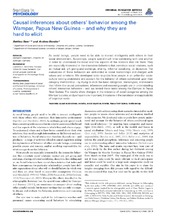| dc.contributor.author | Beer, Bettina | |
| dc.contributor.author | Bender, Andrea | |
| dc.date.accessioned | 2016-01-20T11:51:22Z | |
| dc.date.available | 2016-01-20T11:51:22Z | |
| dc.date.issued | 2015-03-10 | |
| dc.Published | Frontiers in Psychology 2015, 6:128 | eng |
| dc.identifier.issn | 1664-1078 | |
| dc.identifier.uri | https://hdl.handle.net/1956/10996 | |
| dc.description.abstract | As social beings, people need to be able to interact intelligently with others in their social environment. Accordingly, people spend much time conversing with one another in order to understand the broad and fine aspects of the relations that link them. They are especially interested in the interactive behaviors that constitute social relations, such as mutual aid, gift giving and exchange, sharing, informal socializing, or deception. The evaluations of these behaviors are embedded in social relationships and charged with values and emotions. We developed tasks to probe how people in an unfamiliar socio-cultural setting understand and account for the behavior of others conditional upon their category membership – by trying to elicit the basic categories, stereotypes, and models that inform the causal perceptions, inferences and reasoning people use in understanding others’ interactive behaviors – and we tested these tasks among the Wampar in Papua New Guinea. The results show changes in the relevance of social categories among the Wampar but also, and perhaps more important, limitations in the translation and applicability of cognitive tasks. | en_US |
| dc.language.iso | eng | eng |
| dc.publisher | Frontiers | eng |
| dc.rights | Attribution CC BY 4.0 | eng |
| dc.rights.uri | http://creativecommons.org/licenses/by/4.0 | eng |
| dc.subject | causal explanations | eng |
| dc.subject | sociality | eng |
| dc.subject | social cognition | eng |
| dc.subject | kinship | eng |
| dc.subject | Papua New Guinea | eng |
| dc.subject | methodology | eng |
| dc.title | Causal inferences about others' behavior among the Wampar, Papua New Guinea - and why they are hard to elicit | eng |
| dc.type | Peer reviewed | |
| dc.type | Journal article | |
| dc.date.updated | 2015-12-21T20:08:50Z | |
| dc.description.version | publishedVersion | |
| dc.rights.holder | Copyright 2015 Beer and Bender | eng |
| dc.identifier.doi | https://doi.org/10.3389/fpsyg.2015.00128 | |
| dc.identifier.cristin | 1248061 | |
| dc.subject.nsi | VDP::Samfunnsvitenskap: 200 | |
| dc.subject.nsi | VDP::Samfunnsvitenskap: 200::Psykologi: 260::Sosial- og arbeidspsykologi: 263 | |
| dc.subject.nsi | VDP::Social sciences: 200::Psychology: 260::Social and occupational psychology: 263 | |

